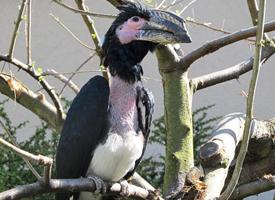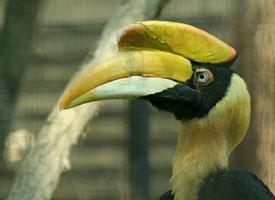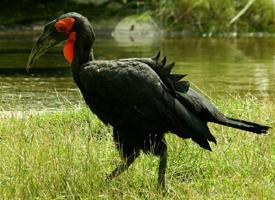
Connu aussi comme
- Zoborožec křiklavý
Description de l'animal
The Trumpeter Hornbill (Bycanistes bucinator) is a captivating bird species, renowned for its distinctive call that resonates like a trumpet, hence its name. Native to the forests and woodlands of Africa, particularly in regions south of the Sahara, this bird is a sight to behold and a sound to be heard. With a preference for dense forests and riverine woodlands, the Trumpeter Hornbill has adapted well to its environment, contributing to the rich tapestry of African avifauna.This medium-sized bird boasts a predominantly black plumage that gleams with iridescent hues under the sunlight, creating a mesmerizing effect. The belly and the tips of the tail feathers contrast this dark coloration with a striking white, adding to the bird's elegant appearance. One of the most notable features of the Trumpeter Hornbill is its large bill and casque, a protuberance at the top of the bill, which is more pronounced in males than in females. The bill, which is yellow and black, serves not only as a tool for foraging but also plays a significant role in the bird's vocal activities.
The Trumpeter Hornbill's diet is omnivorous, consisting of fruits, insects, and small animals. It plays a crucial role in the ecosystem as a seed disperser, helping to maintain the health and diversity of its habitat. The bird's foraging behavior is a spectacle in itself, as it skillfully maneuvers through the canopy in search of food, often participating in mixed-species feeding flocks.
Breeding behavior of the Trumpeter Hornbill is as fascinating as its physical appearance. The species is known for its unique nesting strategy, where the female seals herself inside a tree cavity using mud, droppings, and fruit pulp, leaving only a small slit through which the male feeds her and, later, the chicks. This remarkable adaptation protects the vulnerable eggs and chicks from predators and is a testament to the bird's complex social behavior and the strong pair bond between mates.
The call of the Trumpeter Hornbill, a deep, resonating sound that can be heard over long distances, is one of the most characteristic aspects of this species. It serves as a means of communication between members of a pair or a flock, helping them maintain contact in the dense forests they inhabit.
Despite facing threats from habitat destruction and fragmentation, the Trumpeter Hornbill remains relatively widespread and is not currently considered endangered. However, the conservation of their habitat is crucial to ensure the continued survival of this remarkable species.
In summary, the Trumpeter Hornbill is a symbol of the African wilderness, embodying the beauty, complexity, and resilience of nature. Its striking appearance, intriguing behaviors, and the haunting beauty of its call make it an unforgettable part of the rich biodiversity of the African continent.
Animaux similaires
Nouvelles photos d'animaux
Top 10 des animaux
- Dolphin gull (Leucophaeus scoresbii)
- Diana monkey (Cercopithecus diana)
- Moustached guenon (Cercopithecus cephus)
- Galápagos tortoise (Geochelone nigra complex)
- Japanese macaque (Macaca fuscata)
- Stone loach (Barbatula barbatula)
- Russian tortoise (Testudo horsfieldii)
- Greek tortoise (Testudo graeca)
- Common flying dragon (Draco volans)
- Vendace (Coregonus albula)

